- Home
- Fay Weldon
Long Live the King Page 6
Long Live the King Read online
Page 6
One way and another it was a full hour before engines from Lacock and Bath arrived. By then most of the able-bodied males of Yatbury were there with hoses, buckets and axes, doing what they could to save church and barn, but to no avail. No one thought to make sure that those in the Rectory had been alerted to danger: it was a surprise to everyone when flames leapt from the barn roof to run down the Rectory walls, devouring dead ivy on the way, to catch the window sills of the ground floor, crack the windows, suck out the heavy velvet curtains, belch them back in again, in flames, and let in a funnel of air to turn the wide central staircase into a furnace and pour heavy smoke into adjacent rooms.
And where was the family? The firemen checked the master bedroom with its big curtained double bed and, finding it empty, assumed the occupants had escaped: no one had told them there was a child, or indeed a maid. The firemen turned their attention back to the barn: the hoses ran dry: the wind howled. Rain did not fall, but ill-fitting hoses had turned hard ground to sucking mud. Confusion reigned. There seemed to be no one in charge. Putting out flames was one matter: seeking out and imposing their will on the Rev. Hedleigh’s life, even to save it, seemed too complex a matter to undertake.
It was fortunate for Adela that Ivy and George came running up to the house when they did: one quick look showed Ivy both that the house was alight and that the family had not escaped to the garden. She hustled George round to the back of the house, and pointed out Adela’s window on the first floor, above the back stairs to the kitchen annexe. Flames were flickering round the back door of the annexe and the handle was already hot. George seized it and turned it nevertheless; but the door was locked. He shouldered it open with one powerful thrust and crashed through to the corridor. Flames followed him down the passage; he looked back to find them leaping after him up the stairs like hounds determined to follow their master, come what might. He outran them.
Ivy directed firemen to the two small attic bedrooms where the Hedleigh parents slept, two separate rooms for two hard, narrow beds, and two single horsehair mattresses. The rescuers had to find ladders and manoeuvre them into position in slippery mud and sudden driving rain. It all took time which the Rev. and Elise, alas, did not have.
The Rescue of Adela
Adela slept: her dreams were troubled, sometimes of fairy princes, sometimes of monsters, often the one melding into the other. She had been reading The Blue Fairy Book in bed, and fallen asleep reading, a silly thing to do. She needed to stay awake, in case she heard her mother’s foot on the creaking stair, first one from the bottom, which gave Adela time to push the book under the mattress and pretend to be asleep. Not that the book had been specifically forbidden but Ivy had given it to her the Christmas before last, spoils from her own mother’s market stall, and one look at the curly blue swirls and slender, waiting maiden of the cover, and Adela had hidden it at once. It would put ideas in her head, it would lead her astray, whatever astray was. She knew the book by heart by now, every illustration, the lineaments of every fabulous dragon, monster, pretty maiden, cruel stepmother and damsel in distress, as delivered in pen and ink by Henry Justice Ford. She was the beautiful miller’s daughter, tormented by the hideous goblin, Rumpelstiltskin. Perhaps she was the goose girl, once a princess until her maid betrayed her, waiting for the prophecy to come true: that she would bear the queen’s daughter. However one worked that out. Snow White and Rose Red, bear and dragon, came and went in her half-waking dreams, and tonight more than ever. She was hungry. Ivy had forgotten the cream, and the sugar: she, Adela, thank you very much, might as well go hungry as eat dry bread. Come to think of it she would rather be asleep.
She slept, or half slept, luxuriously: she was in love with the shape, the feel of her own bare arm, curved over her head. It was the bare arm of the miller’s daughter as Rumpelstiltskin pushed open the door to peer at her with curious eyes, and then the blanket was pushed back. She was uncovered. She was lifted from the bed. She was being abducted. Her nightgown was rucked up: she tried to pull it down, but where were her hands? Hanging down, as was her head, her hair falling free; her body slung over a shoulder, a male shoulder, the prince’s shoulder. He hadn’t even bothered with the kiss. She could smell burning, she smelled sweat and cows: she could hear crackling, and crashings and hissings; she opened her eyes and stared at white fabric, moving as the body beneath them moved, as she moved. A man’s shirt. White linen. That’s what a prince wore. Bump, bump, bump; her own body moving as his moved. They were coming down stairs. She turned her head to one side, to save her nose, opened her eyes. Flames. She was being saved from fire; her prince had come, to snatch her from the jaws of death. The house was burning down. Her fault. He had the strongest, broadest shoulders. It was all totally extraordinary yet all totally inevitable. She was coughing: smoke was down her throat. A most remarkable feeling was rising in her: an excitement: a power she could not control both pleasurable and terrible; something you struggled to achieve, it was a bubble: it swelled and swelled, without so much as a by-your-leave, and then it burst, leaving her with the oddest tingling of completion, some need served, some duty done, that all that was meant to be was satisfied, and they were out of the house, and everything was normal again except she was lying on the ground on cold grass with rain spattering onto her face, and a hundred Rumpelstiltskins staring at her:
Today do I bake, to-morrow I brew
The day after that the queen’s child comes in;
And oh! I am glad that nobody knew
That the name I am called is Rumpelstiltskin!
Where on earth had that come from? The goose girl had been asked to guess his name, of course. Someone put a blanket on her and she thought it would be nice to go to sleep again, and wake up and deal with things in the morning.
But Ivy was there looking down at her.
‘Who was that man?’ asked Adela.
‘My boyfriend,’ said Ivy. ‘Quite the hero. I hope it doesn’t go to his head. He’s got nasty burns on his hands. I’d better go and look after him. This kind lady here will look after you.’
And Ivy’s face went away.
The kind lady was taking off her own cloak and putting it under Adela presumably to save her bottom from damp, which was nice of her. The lady had big teeth and a big jaw, very many smart clothes and an air of being in charge.
Adela sat up but the lady pushed her down again.
‘Don’t look,’ said the smart lady. ‘Best not to look.’ But Adela had already looked. Firemen were carrying out a single stretcher, and silhouetted against the fiery background was a strange shape, composed of two twisted and charred figures, half sitting, half lying, which reminded Adela of what Ivy sometimes did by way of entertainment: took two matches, put their heads together, lit them, and watched the heads fuse and flare up, the stick bodies seem to rise in the air, embracing and twisting. Elise had caght Ivy doing it and had been very angry, for reasons Adela did not understand.
‘Smoke inhalation,’ the coroner had declared later. ‘They did not suffer.’
‘Whole place, up like a torch,’ said Ivy’s mother Doreen. ‘And I’d like to know where you were tonight, my girl, if you weren’t in the bed you should have been.’
‘Oh thank you, Ma,’ said Ivy, sarcastic.
A Journey to Wells
Mrs Henrietta Kennion, the Australian wife of the Bishop of Bath and Wells, had been passing through Yatbury in a carriage on her way home to the Bishop’s Palace in Wells, in the company of her nephew Frank, when they noticed smoke and heard a commotion ahead. Although it was so dreadful a night – she had been up most of it attending the sickbed of an old friend – and it was to be Christmas Eve in the morning and a very busy time indeed in the Church Calendar, she had the carriage stopped. She had been horrified to realize that the fire was at St Aidan’s, in her husband’s diocese, and that the fire, fanned by an unreasonably strong wind, had spread to the Rectory too. She hastened out with Frank into the wet and chaos of the night, and was in tim
e to see, in the reddish, smoky reflected light of flames upon the low clouds overhead, the church steeple with its melting weathercock collapse and fall in upon itself. St Aidan’s and its troublesome rectory had been a thorn in her husband’s side for some time, but all the same it was a most upsetting sight.
‘Magnificent!’ cried Frank – who, Henrietta had to remind herself, was a young man who lived for his art – and he ran back to the coach to fetch the satchel where he kept his sketchbook and charcoal. Thus it was that he missed the sight of George carrying the half-conscious Adela out of the Rectory across the threshold to safety, but in time to see her laid upon the ground, and then the firemen, who seemed hopelessly disorganized, bring two distorted bodies out on their single stretcher. It was a horrible sight: the kind you did not forget. It would not be fitting, in the presence of death, to take out charcoal and draw, though he was tempted. He would record it in his mind for future use.
‘It’s the Reverend Hedleigh,’ said Henrietta, aghast, ‘and his wife. He’s a great trouble to my husband but who could wish an end like this for them?’
‘It will have been from the inhalation of smoke,’ Frank said firmly. ‘They will not have suffered. These are not bodies that struggled to get away,’ and Henrietta was relieved to believe the young man. She was fond of Frank: he saw the best in everything, and so the best tended to happen: saw good where others saw evil. She was glad to have him with her, Frank Overshaw, her sister’s son aged twenty-nine, born in South Australia. He’d come all the way over to England to study for Holy Orders, and then changed his mind, and now he studied art at the Slade, and wrote poetry for little literary magazines. But he was a thoughtful, supportive and practical person, always prepared to make the best of things and share his good nature with anyone who seemed in need of it.
It was Frank who pointed out that the daughter, her face smeared with soot and mud, her hair wet, whose eyes were open but who seemed to be in shock, might be beneath a blanket but was lying on the ground in a thin nightdress on wet muddy ground. Once she was wrapped in Henrietta’s cloak it was Frank who, with the coachman’s help, got Adela to the carriage and settled her there under fur rugs.
A large-boned, practical young woman, who seemed to be the maid at the rectory, and was busy with bandages, told Henrietta there were no immediate friends or relatives, the ambulance had been called but would take its time, and the best thing Henrietta could do was take the girl off somewhere safe and warm. Henrietta said this was what she intended to do. It was fortunate that the maid knew the name of the family solicitor – she had taken letters to the post often enough – and was able to write down the firm’s name slowly but legibly.
So that was how it came to be that when Adela came to open her eyes, it was to discover herself bumping along in a carriage on the road to Wells, all but naked amongst strangers, her hand held by a woman she did not know but who told her she was the wife of the Bishop of Bath and Wells, whom she knew only as her father’s enemy, telling her that her parents were dead.
They asked her what her name was and Adela tried to tell them but, oddly, found she could not. Her lips seemed to be sealed. Adela was a person with a mother and a father; now she was without them she didn’t see how she could claim the name. She had seen the entwined and twisted black shapes on a stretcher and if she thought about it knew what she had seen. Everything from now on would be different. It was not necessarily worse. Dawn was breaking. That suggested breakfast. If she ate she might be able to think.
A young man with watery blue eyes and narrow shoulders was sitting across from her, staring at her. He did not look strong enough to fling her over his shoulders. He had a piece of charcoal in his hand and was drawing her. It seemed a great impertinence. He had a silly expression on his face, a kind of devoted intensity which annoyed her.
‘I’m so sorry, my dear,’ the woman with the big teeth and the large jaw was saying. But she looked kind. She had tears in her eyes. Adela closed hers again.
‘I think she’s in shock,’ she heard the strange woman say. ‘Poor little orphaned thing.’
‘Death shall have no dominion. The body dies, the soul goes on,’ said the young man.
‘Oh please, Frank, none of that Theosophy stuff,’ said Henrietta. ‘Not now. We’re all much too tired. And do put away your artistic things. Just leave the poor girl be.’
‘But this has to be recorded,’ he said. ‘She is an angel, dropped from the skies. An angel in great distress, but look at the purity of that chin, the clarity of the cheekbones. How often in life does this kind of thing happen? I feel we are twin souls. I am blessed. It is karma.’
‘She could do with feeding up,’ said Henrietta. ‘She is much too thin.’
By the time the carriage had reached the moated mediaeval castle that was the Palace of the Bishop of Bath and Wells, Frank Overshaw, unmarried, artist, Theosophist, heir to the hundred-thousand-acre Overshaw Estate in Western Australia, a vast area of scrub and brush, but which included the small town of Overshaw and three working gold mines, announced that he was in love with Adela Hedleigh.
‘Oh don’t be absurd, Frank,’ said the Bishop’s wife, whose brother was Governor of South Australia, whose husband had been the Bishop of Adelaide until promoted to Bath and Wells, who knew nothing about her new ward’s aristocratic connections, and was never one to be nervous of speaking her mind. ‘You have no idea who or what she is. You know nothing about her at all.’
‘She is an angel dropped from heaven,’ he said, stubbornly. ‘She is my destiny.’
Frank tried to take Adela’s hand but she shook his off, instinctively, like a cat might shake off an annoying fly.
His Lordship Fights Back
On the morning of Christmas Eve his Lordship called by his family solicitor and financial advisor, Mr Eric Baum, to sign some papers and receive further dividends from the Modder Kloof mine. He was in fine good humour. The news was that the gold seam showed no signs of running out, and the magnesium mines further north, in which Mr Baum too had an interest, continued to produce effectively and efficiently.
Mr Baum pointed out that native labour was becoming more expensive and his Lordship might consider shipping in coolies from China as a cheaper option.
‘Rosina wouldn’t like that one bit,’ said his Lordship and laughed. ‘She’s a Liberal at heart, the silly girl.’
Mr Baum controlled the urge to raise his eyebrows and snort. He found Rosina a very trying young woman but knew better than to say so. These people fought furiously within families, but bonded instantly at the slightest hint of criticism from without. He let it go, for the moment.
His Lordship announced that he and Isobel were setting off for Sandringham that afternoon to spend a few days over Christmas Week with their Majesties, and Mr Baum nodded, as if this was nothing out of the ordinary. But he was awed and impressed, and marvelled at his own good fortune. He had taken on the Hedleighs and their money problems as a favour to the great financier Ernest Cassel, friend of the new King, and here he was himself within spitting distance of royalty.
‘Oh and by the way,’ his Lordship then said, ‘the date of the Coronation has been decided. It’s June 26th. They’ll announce it any day now. We have a couple of spare seats in the Abbey. Perhaps you and Mrs Baum would like to take them up? Watch the Dilbernes parading in all their glory? There won’t be much sitting around for us, of course. But you’re very welcome.’
‘I am sure Mrs Baum would be delighted and honoured,’ said Mr Baum, as calmly as he could. ‘I believe Mr Hubert Parry is composing something for the occasion. She is very fond indeed of Mr Parry.’
To think! Only two years ago he and Naomi had lived above a shop in the East End. Now this! He was as happy for her as he was for himself. More. Her place in London Society was assured. She had given up so much for him, risked so much, suffered so much, complained so little. Thus love was rewarded.
‘Well,’ said his Lordship, ‘you must be busy, Mr Baum. I’ll le
ave you to it,’ and he was off, with a courteous nod of acknowledgement to Rachel the secretary, who once he was gone said, ‘Oh Mr Baum, the Coronation!’ and all but fainted. Eric Baum had to bring her a glass of water.
He would wait until he got home to tell Naomi. He hoped he would not have to work too late. He would stop by Samuel the jewellers and buy her a Christmas gift. He had bought her a simple gold bracelet for Hanukah but he did not think she would object too much to an extra one set with diamonds, which he had seen at the time but thought too expensive, although in principle Naomi set her face against observing the Christian religious festivals. ‘When in Rome do as Rome does,’ was Eric’s motto. Little by little she would come round to his way of thinking.
But at lunchtime the pattern of the day changed abruptly. The phone rang and it was someone from the Bath and Wells Diocesan Office, with the dreadful news of the calamity that had befallen two of his clients, the Reverend and Mrs Edwin Hedleigh. The caller sounded comparatively young and had a slight Australian accent. Mr Baum found himself oddly unmoved by the news of the deaths. He had met the Reverend and his wife on two occasions and both had been as disagreeable as meetings with Robert were agreeable. He was glad to hear that at least the daughter was safe and well, and said so, but was very conscious of a great deal of hard work ahead. He knew he had Edwin’s will in his safe but not Mrs Hedleigh’s, which she had intended to send by post. When a married couple died in an accident a matter of who died first might well arise. He asked after the girl – Adela? was that her name? Mr Baum could hardly remember – and was told she was well but shocked and was welcome to stay at the Palace in the Bishop’s and Mrs Kennion’s care until relatives could be contacted to collect her. Mr Baum said he would be happy to reimburse any expenses incurred, and that he would at once inform the Earl of Dilberne of the unhappy news.

 Trouble
Trouble The Heart of the Country
The Heart of the Country Wicked Women
Wicked Women Mischief
Mischief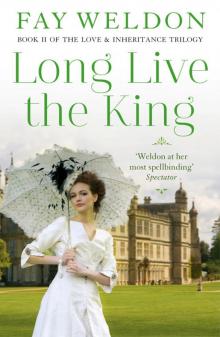 Long Live the King
Long Live the King Remember Me
Remember Me Worst Fears
Worst Fears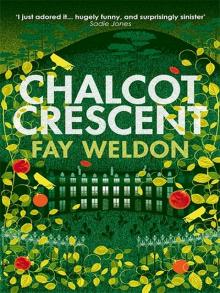 Chalcot Crescent
Chalcot Crescent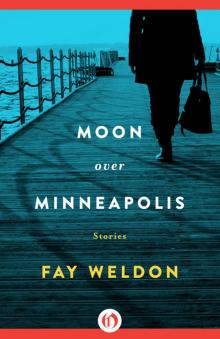 Moon Over Minneapolis
Moon Over Minneapolis The New Countess
The New Countess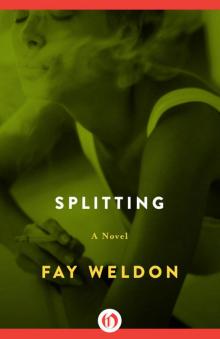 Splitting
Splitting After the Peace
After the Peace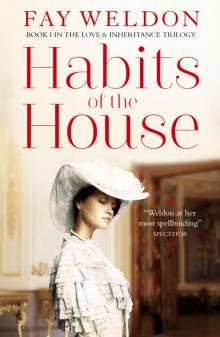 Habits of the House
Habits of the House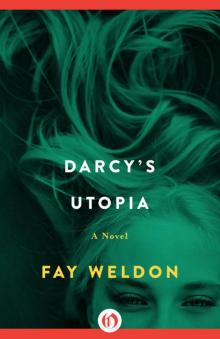 Darcy's Utopia
Darcy's Utopia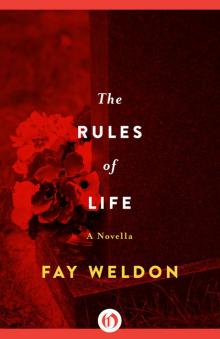 The Rules of Life
The Rules of Life Kehua!
Kehua! Before the War
Before the War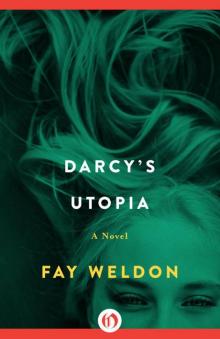 Darcy's Utopia: A Novel
Darcy's Utopia: A Novel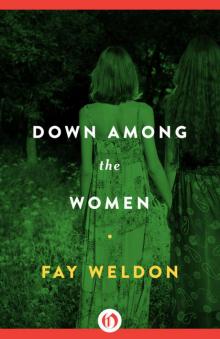 Down Among the Women
Down Among the Women Letters to Alice
Letters to Alice 3 Great Historical Novels
3 Great Historical Novels Female Friends
Female Friends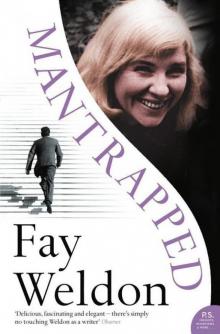 Mantrapped
Mantrapped The Bulgari Connection
The Bulgari Connection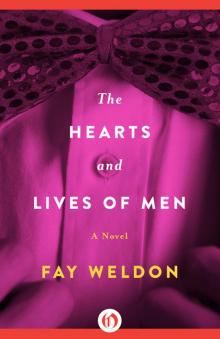 The Hearts and Lives of Men
The Hearts and Lives of Men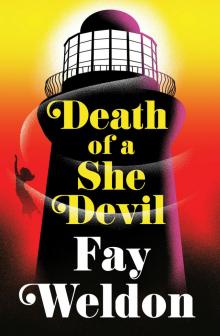 Death of a She Devil
Death of a She Devil